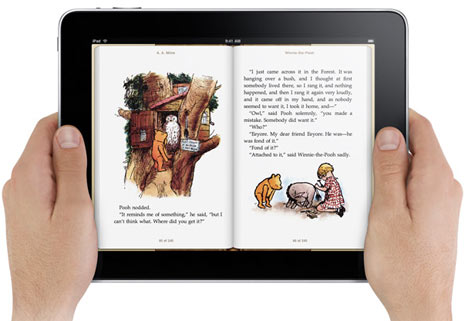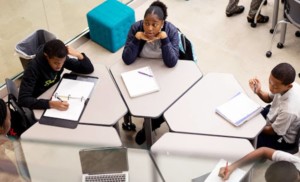It’s Time to Disrupt the System
For as long as I have been involved in education, the focus for finding the key to fixing education has always been about providing professional development for the teachers and administrators. The philosophy is top-down with the intent that knowledge will eventually trickle down to benefit the students.
But, during one of the two ISTE Ignite sessions, I listened to the well respected “education disruptionist,” Will Richardson, sum up 19 of his bold beliefs about education in exactly five minutes. His five minutes were not just inspiring, but I heard it as a call to all educators to stop putting up road blocks and open up the classrooms and allow learning to become powerful and impact the world. There are so many things we are not doing right and, according to Mr. Richardson, we need to start asking “Why wouldn’t we…?” It’s truly five minutes of slides that kindles limitless conversation among those interested in education and definitely worth the few minutes it takes to watch:
In the last few years, technology has invaded, like it or not, and the school experience is shifting faster than ever. Districts and schools are desperately trying to keep up with plans for implementing and integrating tech tools for their students. The powers that be look at all aspects, weigh the pros and cons and finally make a decision on how technology will enter classrooms, most commonly, without ever hearing a word from the actual students who are meant to benefit.
I live in a state where this approach seems to be generally moving very slow and NOT always in the right direction. Although our community culture seems to be progressive, our schools, both public and most private, have yet to figure out a progressive action plan. I am worried that our students are falling farther and farther behind, not having the proper access or skills for what we often refer to as 21st century learning.
It’s Time to Shift Our Focus
It’s time for students to take control of their own learning instead of waiting for the technology to be handed to them! In fact, most students I know already have it, they are just forced to keep it at home. Let these digital learners take the lead and leave the teachers and administrators who have been reluctant to embrace technology learn from their students. Lets stop asking them to sit on their hands and wait for the generation “in charge” to make sure it all fits in their comfort zone.
Wait though- just because we refer to our students are digital natives doesn’t necessarily mean they are “born” knowing how to dive into academics with any digital device we put in their hands. Trust me, I know my own kids would always chose Angry Birds over a learning task on the iPad. But, the advantage is that they don’t remember life before computers or mobile devices, so they are completely open to using these tools and much quicker to integrate them into their lives. Just look at the practice of “texting” basically a nonexistent skill five years. It was our kids who mastered it but it took us adults a good couple of years to just get over it, catch on and accept texting as a valid and very effective form of communication. Our students figured it out WAY before us,even though we, as adults, owned the cell phones first. Once our kids truly figure out learning is much more effective on a tablet, they will never turn back. We simply need to expose them to these powerful learning tools.
It’s Time to Try New Things
Imagine reading a novel, just slightly above your natural reading level, and being able to INSTANTLY look up any unfamiliar word. Not even having to put the book down and shifting over to thumb through the dictionary! No, now the definition pops up within the context of the book with a touch of a finger. What if, as you read you’re just not understanding the author’s voice. Today, one click allows a reader to highlight any passage and have it read out loud back to them, aloud!

Ereaders give students complete access to texts that were once considered to be beyond their abilities. Ebooks magically allow the reader to ask questions of their teachers and peers while reading at any time or place. Students can research answers to comprehension questions or essay prompts from INSIDE the book they’re reading. Learning will not be confined to the classroom, or even a notebook or piece of paper ever, ever again. Students learning today goes so much a deeper and is so much more real when they have these tools in their hands.
As a teacher and a strong believer in technology, I know that these are just a few of the benefits of reading in iBooks. I know so many other great educators who recognize the potential, also. I get frustrated when I am talking to other teachers, parents and even students who shy away from this incredible technology simply because it looks different than what they are used to. Students are ALWAYS going to read, write, calculate, problem solve, research, master, create, present, share…. The list goes on and on. But 21st century learners need to feel comfortable and confident in performing all these skills in a deeper, more meaningful way that will allow for a connection to our world that will eventually lead to their ability to change it!
Our kids have proven they want and are ready to use technology to function. We can’t let the naysayers at the top of the education food chain stop them from accessing this type of learning any longer. We can’t make excuses for why its NOT happening.
It’s Time to let the Digital Natives Lead
We don’t have to blow the budget on professional development anymore. Instead lets make the classroom a safe and open place to bring their tools to learn how to use them properly! Lets model how to best use these tools to learn and take the focus off how to use them to teach. Let’s hand the power over to the kids- introduce the tools, give a little guidance and direction, and just a glimpse into the potential… and I am willing to bet just about anything, that the students will naturally run with it. We will watch them take the tech and go BEYOND what we, as educators, could ever imagine, and we will just have to try and keep up.
SD- Student Development is a website with collection of MentorMob playlists, developed specifically for students who are looking to use their personal technology in school and for learning, especially their school hasn’t offered it to them, yet. I know too many students who leave their iPads and Ereaders, even laptops at home because they think they’ll get in trouble or laughed at if they bring it to class. It really only takes a handful of kids in a school to start to embrace the 21st century learning style, and, like wildfire, it’ll spread before the powers that be can say no.






Ed Jones
Amen to that. It's why we've destroyed our career, and in the past six months pushed out OhioCreditFlexibility.org. There's no money left in the ed system for growth; there won't be; the only solution that can catch up is students-first. (With some early-adopter teachers).
Tech isn't everything; far from it. But if we want to grab these high-speed kids before we lose them forever, we'd better push the power into their hands very, very soon.
Grant Lichtman
Agree with all that you say with the reminder that every bit of is applies to non-technology learning as well. Students who are part of their own learning design and developing an arc of questions. problem finding, and systems approach to problem solving are more engaged and better learners. Tech just happens to be a place where this is amplified because they know more than we do!
Stacie
I just don't understand why the idea of pausing your reading to look up a word (or even utilizing context clues instead of looking up every single word you don't know) is so offensive to you. Furthermore, I really don't understand how students without reading comprehension skills are suddenly going to improve because of a different format. If they can't understand what they're reading, they can't understand what they're reading, and that problem needs to be addressed at its core, not have technology thrown on it like it's some magical cure-all.
I also am really perturbed by the idea that all students have access to iPads and e-readers and just aren't bringing them to school. A lot of students have families that can't afford (or choose not to purchase) these things--where is there access? Why aren't you concerned that they're going to be "laughed at" when everyone else has a shiny new toy, the efficacy of which has yet to be proven, and they don't?
John Jensen Ph.D.
The search for central directions for ed reform continues to bypass a very basic point. You may already be familiar with this point and have for some reason dismissed it. But if not, writing about education reform, it can be helpful to understand a fundamental principle vastly underutilized in most schools--insuring that most students get only superficial learning. It's the strict correlation between practice and skill development of any kind--whether a physical skill or a zone of knowledge. Missing this is like trying to run a high-tech automobile while not understanding the principle behind the firing of gasoline. Get this right and classrooms turn around in a few days. No one's fault, just a principle overlooked. Here are two links to brief articles explaining the idea:
http://www.educationnews.org/k-12-schools/john-jensen-just-one-teaching-tweak-can-mean-better-learning/
http://teaching-in-the-middle.com/wordpress/index.php/2012/06/15/what-went-missing-in-education-guest-blog-from-dr-john-jensen/
Best regards, John Jensen
Ryan Bretag
Your passionate call is to be commended, but I have to ask you about your notion that kids want this in conjunction with your eBook point.
Where are you drawing this conclusion?
Sonja Girard
Fabulous!
As Ken Robinson proposes our education systems don't require reformation, but rather, transformation. We need a new paradigm, as Richardson concurs. Thanks for sharing.